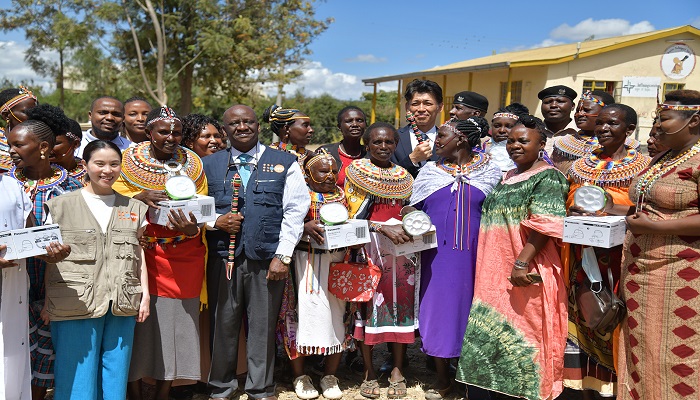2,000 Solar Lanterns Donated to Off-Grid Areas in Kenya with Support from United Nations Population Fund
Panasonic Group —working through the United Nations Population Fund (UNFPA)—donated 2,000 solar lanterns to Samburu and West Pokot counties in Northwest Kenya.
Panasonic launched a project to provide 100,000 solar lanterns to people living in off-grid areas in 2013; the purpose of the project was to help people escape from poverty attributed to a lack of access to electricity. In 2018, this initial project was succeeded by the “LIGHT UP THE FUTURE” project for off-grid areas. LIGHT UP THE FUTURE endeavors to contribute to the creation of a sustainable society free of poverty by collaborating with NGOs/NPOs, international organizations and other partners to deliver lights powered by Panasonic’s renewable energy technology to areas that lack electricity and create opportunities for education, health, and increased income. This recent project focused on promoting women’s empowerment and saw Panasonic work together with the United Nations Population Fund (UNFPA), an international organization dedicated to reproductive rights and access to sexual and reproductive health services, to distribute 2,000 solar lanterns manufactured by Panasonic Energy Corporation to households with women and children in Samburu and West Pokot counties in Kenya.
In non-electrified areas of Kenya, old customs prohibited by modern law are still practiced, including child marriage and female genital mutilation (FGM). Being pregnant while one’s body hasn’t fully matured presents a high risk for both mother and child, and raising children at such a young age deprives girls of education and other opportunities. FGM can also involve surgical removal with unhygienic blades, resulting in issues such as massive bleeding and suppuration (formation of pus). The root cause of this continued adherence to old customs is poverty. In areas lacking industry and a stable job market, families often need to rely on livestock received as a dowry when marrying off a daughter, and poor families may resort to performing FGM to marry off their daughters as early as possible. UNFPA is confronting these issues, and Panasonic’s decision to donate solar lanterns through the organization is designed to help women become independent and lift themselves out of poverty, reducing the need for old customs.
UNFPA supports the production and sale of local ornamental beadwork as a source of income for women. However, because this is an off-grid area, it is nearly impossible to do this beadwork at night. We are addressing this issue by donating solar lanterns that will make it possible for local women to produce this work at night. The lanterns will create opportunities for the women to increase their income and promote their empowerment. The lanterns will also make it possible to study at night, increasing educational opportunities for both boys and girls, which then allows them to deepen their understanding of these customs in addition to their regular studies.
UNFPA and Panasonic visited Samburu County and took part in a ceremony to commemorate the donation. Joining them were the Samburu County Commissioner, the Deputy Director for Gender, and the CEO of the Anti-FGM Board. During the ceremony, Naoyuki Tada, CSR & Citizenship Office, Panasonic Holdings Corporation had this to say: “We hope these lights help improve the educational level of children and raise household incomes, leading to an end to the gender gap and poverty. We believe that eliminating gender inequality and poverty will be a catalyst for change regarding the old customs and social structure.” The solar lanterns were then handed out to children and women. Some women tried out the solar lanterns and were surprised how brightly their rooms lit up. “With this lantern, I can do a lot of beadwork—even at night,” said one delighted resident.
Panasonic will continue to promote the LIGHT UP THE FUTURE project with the aim of realizing a “sustainable and inclusive society” where everyone can live a vibrant life more freely.
Source: Panasonic




[…] on this initiative, Panasonic launched the “LIGHT UP THE FUTURE” project with an even greater goal: to utilize our renewable […]